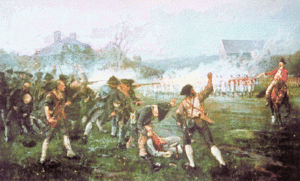 On April 19, 1775, the Battles of Lexington and Concord marked the outbreak of open armed conflict between the Kingdom of Great Britain and its thirteen colonies in the mainland of British North America. They were fought in Middlesex County, Province of Massachusetts Bay, within the towns of Lexington, Concord, Lincoln, Menotomy (present-day Arlington), and Cambridge, near Boston.
On April 19, 1775, the Battles of Lexington and Concord marked the outbreak of open armed conflict between the Kingdom of Great Britain and its thirteen colonies in the mainland of British North America. They were fought in Middlesex County, Province of Massachusetts Bay, within the towns of Lexington, Concord, Lincoln, Menotomy (present-day Arlington), and Cambridge, near Boston.
About 700 British Army regulars, under Lieutenant Colonel Francis Smith, were ordered to capture and destroy military supplies that were reportedly stored by the Massachusetts militia at Concord. Dr. Joseph Warren alerted the colonists of this. The Patriot colonists had received intelligence weeks before the expedition which warned of an impending British search, and had moved much, but not all, of the supplies to safety. They had also received details about British plans on the night before the battle, and information was rapidly supplied to the militia.
The first shots were fired just as the sun was rising at Lexington. The militia were outnumbered and fell back. Other British colonists, hours later at the North Bridge in Concord, fought and defeated three companies of the king’s troops. The outnumbered soldiers of the British Army fell back from the Minutemen after a pitched battle in open territory.
More Minutemen arrived soon thereafter and inflicted heavy damage on the British regulars as they marched back towards Boston. Upon returning to Lexington, Smith’s expedition was rescued by reinforcements under Hugh, Earl Percy. A combined force of fewer than 1,700 men marched back to Boston under heavy fire in a tactical withdrawal and eventually reached the safety of Charlestown.
The British failed to maintain the secrecy and speed required to conduct a successful strike into hostile territory, yet they did destroy some weapons and supplies. Most British regulars returned to Boston. The occupation of surrounding areas by the Massachusetts Militia that evening marked the beginning of the Siege of Boston.
Ralph Waldo Emerson, in his Concord Hymn described the first shot fired by the Patriots at the North Bridge as the “shot heard ’round the world”.